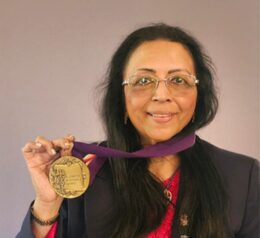Singapore Public Health & Nursing Leadership Conference
SPHC 2026
THEME: "Innovating for Tomorrow: Shaping the Future of Public Health"
 14-15 Sep 2026
14-15 Sep 2026  Singapore
Singapore THEME: "Innovating for Tomorrow: Shaping the Future of Public Health"
 14-15 Sep 2026
14-15 Sep 2026  Singapore
Singapore 
New York Medical College, USA
Title: Beijing Platform of Action and Beyond: The Challenges and Progress in Women’s Health Globally
Padmini Murthy is a globally recognized health professional as a physician and public health expert. Her research interests focus on women’ s health, human rights and global health diplomacy and AI in health care. She is currently Professor /Global Health Director at New York Medical College School of Health Sciences and Practice. She is past chair of the International Health Section of American Public Health Association and is the Global Health lead for the American Medical Women’s Association and the NGO rep to United Nations. She has made over 300 presentations nationally and internationally including the UN and WHO. She is widely published and is the author and editor of Women's Global Health and Human Rights, Technology and Global Public Health. She has been the recipient of several awards and is the 1st American in 78 years to receive the Elizabeth Blackwel medal for contributions to women’s health globally.
Introduction:
“The Beijing Declaration and Platform for Action, adopted in 1995, is a landmark document for advancing women’s health, rights and gender equality globally, focusing on 12 critical areas of concern, and 2025 marks its 30th anniversary, offering an opportunity to assess progress and address ongoing challenges in women’s health and empowerment. The conference marked a significant turning point for the global agenda for gender equality. It is interesting to note Beijing Declaration and Platform for Action, was adopted unanimously by 189 countries, and at present the key global policy document on gender equality is considered.
Progress from 1995 to Present:
Some of the key areas of progress include
1.Improved Maternal Health
2. Improved access to health care for girls and women. 3. Increased school enrollment for adolescent girls.
3. Recognition of women’s health as a priority and investment in women’s wellbeing is key for societal wellbeing and achieving the SDG 20230 goal of Leave No One Behind.
4. Increased attention to addressing violence against women locally, nationally and globally.
Challenges:
1.Uneven progress in women’s health due to increased health disparities in some geographic regions.
2. Gender discrimination, stereotyping and norms can create barriers for girls and women’s health and empowerment.
3. Increased mental health setbacks due to civil unrest, pandemics and climate disasters.
4. Lack of protection and disenfranchisement for women and girls from ethnic minorities and those with disabilities.
5. According to World Health organization almost 70% of health workers are women, but only an estimated 25% of leadership roles in health are held by women.
Recommendations:
It is crucial for multi-level positive partnerships among diverse stakeholders with an investment in women’s health and strong political commitment to and prioritization of urgent issues affecting women, their health, leadership and gender justice – like gender equality, reproductive health and addressing all forms of violence and discrimination against girls and women.
Keywords
Critical areas; Platform of Action; Maternal health; Gender; Discrimination